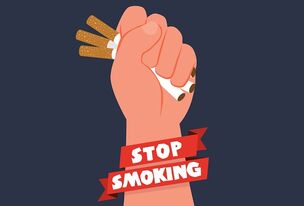The transition to a healthy lifestyle is not as easy as it may seem at first. The withdrawal or withdrawal period, when the body completely rebuilds its work due to a lack of nicotine, can be very painful. This applies not only to changes in the psycho-emotional state - increased anxiety, irritability, but also a deterioration in physical well-being: a cough arises, the functioning of the digestive system changes and headaches torment. The symptoms listed are seen in almost everyone with many years of smoking experience, so not everyone copes and takes what they started to the end.

How to quit smoking without harming your health and how to improve your well-being is important for those who have already had withdrawal symptoms. In order to soften its manifestations, a person who smokes must follow a series of rules - following them will improve the physical and mental state and will allow the person to quit without the unnecessary stress.
General rules to stop smoking
To achieve this, follow these guidelines:
- Competently composed diet. It is known that after a heavy meal: it increases the fat, fried, acute desire to smoke. However, these products should also be excluded from the menu because they create additional stress on the body. At the same time, you should consume herbal teas, fruit juices, mineral water - a large amount of liquid will help speed up the elimination of toxins. It is recommended to consume dairy products - milk changes the taste of cigarettes, smoking ceases to bring pleasure. However, you should drink unpasteurized natural milk, otherwise the desired effect will not be achieved. It is advisable to drink a cup of hot drink every morning.
- It is also important to control your diet because people often “apprehend” the stress associated with smoking and therefore gain a lot of weight. So that there is no fear of putting on weight, light and low-calorie foods are recommended, which will keep you in shape. For snacks, it is good to use not sweets and cookies, but vegetables and fruits.
- Elimination of alcohol, strong coffee and tea. All of these products, along with cigarettes, are characterized by a stimulating effect on the body. Tea and coffee increase anxiety levels and lead to sleep disorders, and alcohol dulls self-control.
- Taking vitamins. Within 1-1, 5 months after quitting, vitamin complexes should be taken. Especially during this period, it is recommended to take ascorbic acid.
- Use of nicotine-containing products. Plasters, sprays, chewing gums, which contain nicotine in a small dosage, help to alleviate the symptoms of withdrawal symptoms. Some people switch to electronic cigarettes - it is easier to stop smoking, although the product is not harmless, so it is not recommended to use it.
- Breathing techniques. To calm down during an irritability attack, it is recommended to use "belly breathing". The technique is safe and is used in yoga, meditation, sports training. The relaxation effect is seen almost instantly. In addition, deep breathing improves the functioning of the digestive system and strengthens the lungs. During inhalation, the abdomen protrudes and, on exhalation, it is strongly contracted by the tension of the abdominal muscles.
- Correct regime and physical activity. During the smoking cessation period, the body is exposed to great stress, so it is necessary to pay attention to the restoration of vitality. Full sleep and sports are mandatory. Physical activity stimulates the production of serotonin, which helps to stabilize the emotional background.

Quit the habit abruptly or gradually
The opinion of psychologists is adamant: you need to quickly eliminate cigarettes from life. With the gradual refusal, the number of cigarettes is gradually reduced or products with lower nicotine and tar content are purchased. A person fights the urge to smoke, but still lights cigarettes, so the body is under constant stress for a long time. The advantage of immediate abandonment is the immediate severance of the psychological and physical connection to the habit.
If you stop smoking abruptly, you need to endure the first 3-5 days - after that time, the body itself will start producing nicotine and physical well-being will improve. However, psychological discomfort can persist for a long time - in any emotionally unstable situation, there will be a desire to smoke.
It should be understood that after a few days without nicotine, inhaling tobacco smoke can cause unpleasant sensations - dizziness, intense tachycardia. The body is clean and feels no need for any substance, but an old habit can take over. For many, these own feelings help to stop forever - it is clear that there is no pleasure, but some smoke several cigarettes in a row, returning to addiction.

In some cases, phasing out is preferable. As a rule, this recommendation applies to people who have smoked for more than 10 years. If blood pressure rises suddenly, seizures appear, severe headaches are tormented, it is necessary to consult a doctor: the doctor, having studied the patient's condition, will be able to answer the best way to stop smoking: abruptly or gradually, andwill prescribe medications that will help deal with withdrawal symptoms. . .
For pregnant women and mothers of breastfed babies, stopping smoking abruptly is the only right decision.
Nicotine is dangerous in any trimester of pregnancy, you cannot feed your baby milk, which contains toxins. Some women say that after they quit smoking, their breasts started to grow. Having noticed these changes, it is recommended to go to the mammologist to ensure. As a rule, these two phenomena are not related, but hormonal changes are possible, and it is better not to leave the condition, but to check. Smoking women need to be careful when using birth control pills. This combination leads to changes in blood characteristics.
Common mistakes and misconceptions
Anyone who has tried to quit has faced the misconceptions cited in his book by popular author A. Carr.
These errors sound like this:
- I'm going to smoke less.
- Only 1 cigarette.
- I'll drag it once.
Deleting all these phrases once and for all is good advice to listen to.
By limiting yourself in this way, you make smoking a pleasure, a gift you crave. The opposite effect is often seen: those who stop smoking even more.
There should be no exceptions called "just one cigarette" - this is a trap, which you have to get out of for years. When it comes to how long it takes to quit smoking, in most cases it takes as long as it takes to knead and discard the packaging. The potential likelihood of smoking lasts a lifetime - it all depends on the person's mood and motivation.

Cigarettes should not be used as aids in the fight against stress and moodiness. They will not help you to concentrate or to calm down - for this purpose, breathing techniques can be used that will prove to be more effective and not harmful.
Don't think that something valuable and important is being taken away from you, becoming a victim. Suffering is not appropriate here, but you can be proud of yourself, because even with the difficulties, you return to a healthy lifestyle.
It is important to surround yourself with non-smokers or at least avoid visits to smokers. Forming your environment is extremely important when a person wants to stop smoking marijuana - here it is impossible to get out of addiction without changing the social circle.
Conclusion
If you can't completely quit smoking at home alone, contact a narcologist. A non-smoker feels the taste of life more fully, takes a deep breath in every sense of the word, so you should not continue to poison your body if you are already in tune with health.























